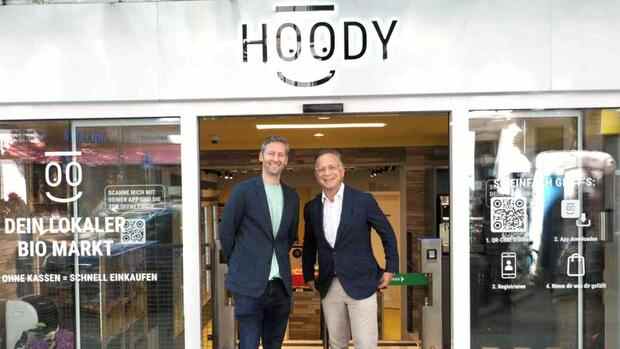Dusseldorf The trading business does not let go of the former Real boss Patrick Müller-Sarmiento. After the chain was sold by the parent company Metro a good two years ago, Müller-Sarmiento initially switched back to his former employer Roland Berger. At the management consultancy, he even became a member of the global management team. At the same time, however, he founded a start-up. The industry: trade.
The company is called Autonomo and a small team has developed a technology with which retail stores can be operated without staff and cash registers – the German answer to Amazon Go, so to speak. Müller-Sarmiento now wants to prove that this technology works in practice. Under the name “Hoody-Markt” he opens Germany’s first cashless organic market in Hamburg. The aim is to sell the concept to other dealers – and thus to expand throughout Europe.
Autonomo is not the first provider for cash registerless stores, but as a system developed in Germany it is a specialty. So far, the existing offers from the large retailers have tended to be pilot projects with which they want to test what can be implemented on a larger scale.
For example, the Schwarz Group has set up an autonomous shop without staff on the Heilbronn University campus, Aldi is trying a checkout-free shop in London, and Rewe is testing the technology of the Israeli start-up Trigo in a supermarket in Cologne. With the Teo concept of the regional supermarket chain Tegut, customers still have to scan the items individually themselves.
Top jobs of the day
Find the best jobs now and
be notified by email.
Awarded the Harvard Founder’s Prize
In the Hoody store, on the other hand, customers identify themselves at the entrance using a mobile app and can simply take goods from the shelves. With the help of cameras and artificial intelligence (AI), the purchases are assigned and billed automatically.
The technology for this was developed by a team of experts in Germany under the leadership of technology chief Pradeep Vallat, who has already worked on checkout-free supermarkets in India. In June, Autonomo received the Harvard Alumni Entrepreneurs Accelerator award for its concept.
The customer himself should be aware of the technology as little as possible. “Our proprietary technology takes a back seat, putting the locally sourced, sustainable food and beverage and shopping experience front and center,” said James Sutherland, co-founder and CEO of Autonomo. Sutherland gained experience in London at various tech start-ups in the retail sector.
Even as head of Real, the Roland Berger consultant developed numerous new retail concepts.
(Photo: picture alliance/dpa)
The hoody stores shouldn’t be able to do without staff either. Each store gets a community manager. This is to advise customers and seek contact with neighboring dealers, who may then be able to sell their goods via the hoody market. “The community manager should also give the store a face so that it doesn’t appear so anonymous to customers,” explains Müller-Sarmiento.
In the coming months, Autonomo plans to open more stores throughout Germany, and international expansion is set to begin next year. According to the company, several trading partners have already signed agreements to integrate the technology.
Prices vary depending on time and demand
Founder Müller-Sarmiento wants to use such partnerships for expansion. Among the seed investors who have provided Autonomo with EUR 2.2 million are numerous retailers who have an interest in using the technology for their own business. According to its own planning, the start-up should be profitable in a good two years. The founders see a sales potential of more than 500 million euros in the medium term.
Even as Real boss, Müller-Sarmiento was open to new ideas. For example, he developed a market hall concept for the stationary shops that focuses on the production and preparation of fresh goods in the shop. Under the name “Emma’s grandson” he tested a checkout-free shop in which the orders were put together using robot technology.
>> Read here: As the Schwarz Group goes on the offensive with Kaufland
He also took over the online marketplace Hitmeister from founder Gerald Schönbucher. Together they developed the Real.de platform, which at times even ran a delivery service for fresh groceries. When Real was broken up, Kaufland paid 100 million euros for the platform alone.
In order to make the hoody markets even more profitable, Müller-Sarmiento wants to try an idea that retailers in Germany have so far shied away from: dynamic prices. This means that the prices of individual products can fluctuate flexibly, like at a gas station, depending on the time of day and demand.
Müller-Sarmiento is not concerned that his work as a start-up founder could collide with his job at Roland Berger – on the contrary: if he is successful in business himself, he can get on even better with the entrepreneurs he advises talk at eye level.
More: Automated store formats – when corner shop is open around the clock
